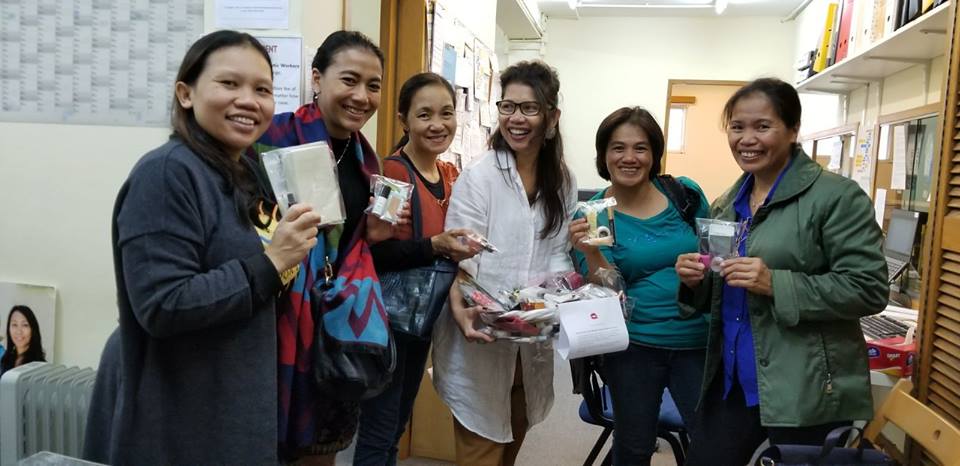Linklaters are a key supporter of HELP, from providing funding to coordinating the rota and training of our Sunday volunteers. We are grateful for their generosity and support. Renee Lee coordinates the pro bono programme for their Hong Kong office, where they provide pro bono support to NGOs locally in Hong Kong, focusing on human rights and access to justice initiatives. We recently caught up with her to find out how she got involved with HELP and why it is so important to support the rights of domestic workers.

Where are you from and how long have you been in Hong Kong?
I grew up in a small suburb of Boston, MA and moved to Hong Kong in 2009.
How did you get involved with HELP? What is your background?
I first heard about HELP when it was known as HDH in 2013 through Deborah Papworth, former Managing Associate and Pro Bono Coordinator at Linklaters. I had just joined Linklaters as a trainee, having switched careers from management consulting in New York to law in Hong Kong. I helped Deborah deliver the first HDH new volunteer induction training at Linklaters in the summer of 2013.
Tell us about your first encounter with a domestic worker?
My first encounter with a domestic worker was on annual trips to see my family in Hong Kong. My cousins had the same domestic worker since they were little and I remember her being an important part of their family. She used to share a room with my cousins until they were too old, cook delicious home cooked meals and take us to the park.
Why do you feel supporting domestic workers, and HELP, is so important?
For as long as I remember, domestic workers have not only been part of families but woven into the very fabric of Hong Kong society. Without domestic workers, the efficient engine driving Hong Kong’s economy simply would not work. We rely on the critical work that they do, from providing affordable childcare to running entire households. I personally could not continue to work full time without my incredibly supportive and skilled domestic worker, Marife, who looks after my one-year old son. While I have had mostly positive experiences working with domestic workers, I can’t say that is the norm in Hong Kong. From a young age, Hong Kong people are sometimes taught that domestic workers are second class citizens and that attitude has pervaded one generation to the next. The basic human rights and statutory rights of domestic workers are often overlooked and they are not treated with the respect that they deserve. There is a gap in understanding what those rights are by employers, agencies and domestic workers and HELP’s work is critical for all parties to understand what those rights are. From volunteering at the Sunday Clinic for the last 5+ years, I can attest to the fact that were it not for HELP’s free advice and support, many domestic workers would have no legal recourse to the injustices they suffered. I am proud to support the invaluable work that HELP does on a daily basis.
From your work with HELP, what are some of the issues domestic workers face in Hong Kong?
Domestic workers are constantly faced with a host of issues, whether it is from unlawful withholding of wages to actual physical abuse. Sometimes a domestic worker simply is not aware of his or her rights and a short conversation with their employer can solve the problem. Domestic workers are often pawns in the agenda of employment agencies, who typically have only one goal: to exploit the domestic worker for maximum financial gain. Agencies are known to sign-up workers to illegal loans, leaving them practically penniless during their entire employment contract and pitting employers against their own domestic workers, in the hopes of placing another domestic worker (and charging further placement fees).
What advice do you have for domestic workers who are being mistreated?
Know your rights! Not only can you call HELP for advice and support, there are also free tools and information online. I highly recommend that domestic workers download the free FAIR Hong Kong App which has information for both domestic workers and their employers in Chinese and English. I regularly use this app to check statutory and updates to the minimum wage for domestic workers but it also has useful information and resources for domestic workers to seek help. Do not be afraid to assert your rights and if you are worried that your employer will not understand, HELP is able to write a letter on your behalf or give your employer a call.
What do you wish the public knew about domestic workers in Hong Kong?
Domestic workers are mothers, sisters, daughters, and breadwinners they are human beings and not employees that can be dismissed and replaced on a whim. Domestic workers are relied on here locally but also back home, where families and extended families count on their income. Domestic workers leave their own children behind so that they can take care of ours so we should cherish them and respect what they do.
What’s the best way to start a conversation with someone who doesn’t understand some of the issues domestic workers face?
I often find the easiest way to start a conversation on the issues that domestic workers face is on a Sunday, when domestic workers are on display in the streets, in the parks just about anywhere where there might be a little space for them to camp out. It’s not hard to see the plight faced by domestic workers when they are so happy to escape on their day off, even if it means sitting on a cardboard box under a bridge on a freeway.
What other charity initiatives are you involved in?
A few month ago, I started Not Just Lip Service Hong Kong, an initiative to collect and distribute unused makeup and toiletries to domestic workers and vulnerable women in Hong Kong. They are currently collecting, sorting and packing makeup and toiletry gift bags for the domestic workers that visit HELP and to the women of Pathfinders.
What do you enjoy doing in your free time?
I enjoy spending time outdoors at the beach or hiking with my family.


